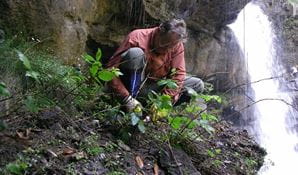What we're doing
Park management activities
Blackheath area is in Blue Mountains National Park. Blue Mountains National Park has management strategies in place to protect and conserve the values of this park. Visit the detailed park and fire management documents. Here is just some of the work we’re doing to conserve these values:
Biodiversity conservation
Blue Mountains National Park plays an important role in conserving NSW’s biodiversity by protecting its vulnerable, threatened and endangered plants and animals. We work closely with Blue Mountains City Council and local partners on conservation activities like the Saving Our Species program, which monitors the habitat, distribution and population of species. Rare species in the Blackheath area include the threatened giant dragonfly, Fletchers drumstick, and endangered Blue Mountains water skink. Blackheath’s ecologically important hanging swamps are also a focus of conservation efforts, with support from Braeside bushcare community volunteers. We also manage risks associated with introduced plants and animals, along with the impact of climate change.
Managing fire
NSW is one of the most bushfire prone areas in the world due to our climate, weather systems, vegetation and the rugged terrain. NPWS is committed to a program of fire research, fire planning, hazard reduction, tracking weather patterns such as lightning storms, and community alerts. This helps to reduce property risk while also recognising the important role of fire in native plants' lifecycles. The Enhanced Bushfire Management Program (EBMP) is in place in the Blackheath area. This fire management program supports response teams of highly trained rapid response firefighters, who can respond to 100% of remote wildfires within 30mins of detection.
Developing visitor facilities and experiences
We’re committed to developing first-class facilities for the enjoyment and safety of visitors to Blue Mountains National Park, one of Australia’s most visited parks. Visitor feedback and environmental sustainability are important in this eco-certified park. Maintenance and upgrades to roads, tracks, trails, campgrounds, picnic areas, lookouts and signage are ongoing. We regularly review the park’s recreational opportunities, identifying areas for improvement or addition. Recent enhancements have been completed for Grand Canyon track and Blue Mountains Heritage Centre. The centre is also a hub for school excursions and international student tours that focus on environmental and cultural education.
Blue Mountains National Park has achieved Ecotourism Destination Certification, through Ecotourism Australia, recognising best practice sustainable tourism and visitation in protected areas.
Understanding landscapes and geology
Geo conservation efforts and research play an important role in protecting the World Heritage-listed landscapes and geology of Blue Mountains National Park. Rehabilitation and maintenance works is ongoing, to limit the impact of erosion, pollution and degradation to these ancient landscapes. The effects of climate change and visitation is also monitored to preserve the area’s delicate ecosystems.
Managing weeds, pest animals and other threats
Pests and weeds have a major impact on the ecosystems and habitats in Blue Mountains National Park. Reducing introduced species is an important part of our work to protect the integrity of the Grose Wilderness, water quality, native plants and animal biodiversity. Bush regeneration and noxious weed removal are a focus of the Great Grose weed walk and Braeside bushcare volunteer programs. These programs play an essential role in preserving protected habitat for threatened species.
Historic heritage
The historic heritage of Blue Mountains National Park is preserved through a variety of NPWS programs that embrace its past. Preservation of tracks and lookouts that have been in use over 100 years ensure assets are conserved and remain safe for the enjoyment of future generations.
Report illegal dumping
It's illegal to dump rubbish, household waste, green waste, construction waste, tyres, or vehicles in NSW national parks and reserves. You can help by reporting it anonymously. If you see illegal waste that has been dumped, or is in the process of being dumped, please take a photo and report it through the Report Illegal Dumping online form, or phone 131 555.
Contact
- in Blue Mountains National Park in the Sydney and surrounds region
Blackheath area is always open but may have to close at times due to poor weather or fire danger.
-
-
Blue Mountains Heritage Centre and Blackheath office
02 4787 8877
Contact hours: 9am to 4pm daily. Closed Christmas Day. - 270 Govetts Leap Road, Blackheath NSW 2785
-
Email: bluemountains.heritagecentre@environment.nsw.gov.au
-
Blue Mountains Heritage Centre and Blackheath office
Get involved
Great Grose weed walk

Beautiful Grose Valley in Blue Mountains National Park is under threat from noxious weeds. If you're a natural gardener and want to help stop invading weeds, volunteer for one of the Great Grose weeding activities.
More volunteering
Donate to NSW National Parks
Your donation will help buy land for national parks and fund practical on-ground actions to protect endangered species and strengthen our work with Aboriginal communities.
